
Find Help
More Items From Ergsy search
-

Prostate Specific Antigen (PSA) test
Relevance: 100%
-

Ask for a prostate specific antigen (PSA) test along with your annual cholesterol check.
Relevance: 82%
-

What is PSA testing?
Relevance: 67%
-

What are PSA levels? - Prostate Cancer
Relevance: 64%
-
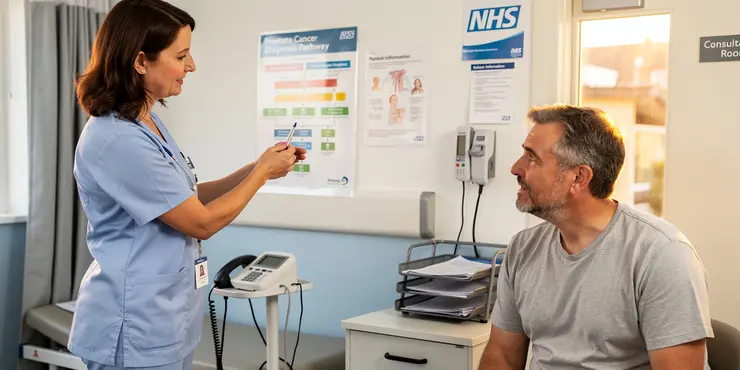
Prostate cancer diagnosis and tests
Relevance: 57%
-

What is the importance of PSA levels in treatment?
Relevance: 53%
-

Does BPH increase the risk of prostate cancer?
Relevance: 43%
-

What is Prostate Cancer?
Relevance: 43%
-
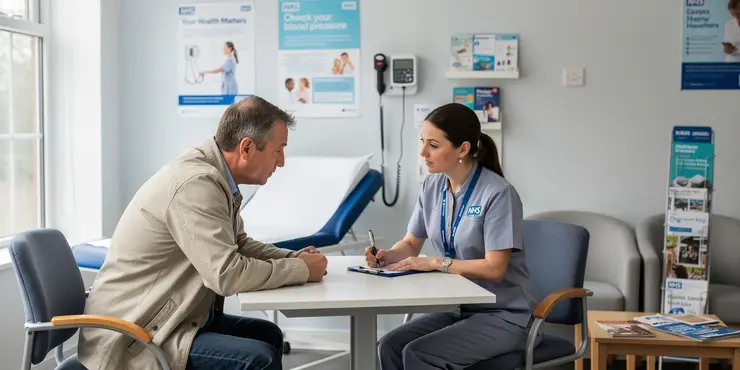
Is BPH the same as prostate cancer?
Relevance: 41%
-

Treating prostate cancer
Relevance: 41%
-

What is active surveillance in prostate cancer treatment?
Relevance: 39%
-

Prostate cancer symptoms - detecting them early
Relevance: 39%
-
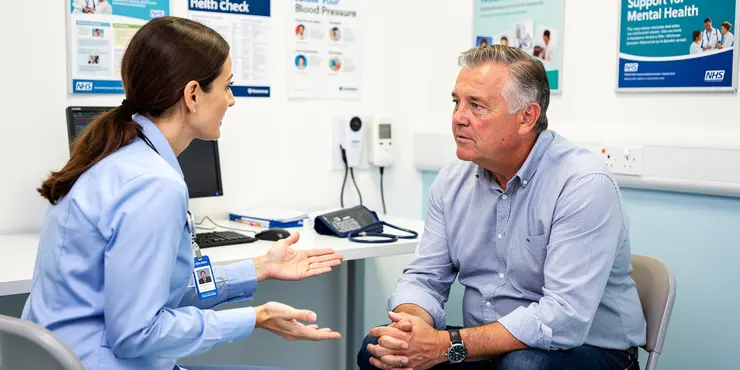
Living with prostate cancer
Relevance: 39%
-

Can prostate cancer recur after treatment?
Relevance: 39%
-

What is the prostate gland's role in the body?
Relevance: 37%
-

what is benign prostate hyperplasia (non-cancerous)?
Relevance: 33%
-

How is prostate cancer treated?
Relevance: 33%
-

What is the purpose of a bone scan in prostate cancer treatment?
Relevance: 32%
-

Why do men get prostate cancer?
Relevance: 32%
-

Am I more at risk of prostate cancer?
Relevance: 30%
-

Prostate Surgery
Relevance: 30%
-
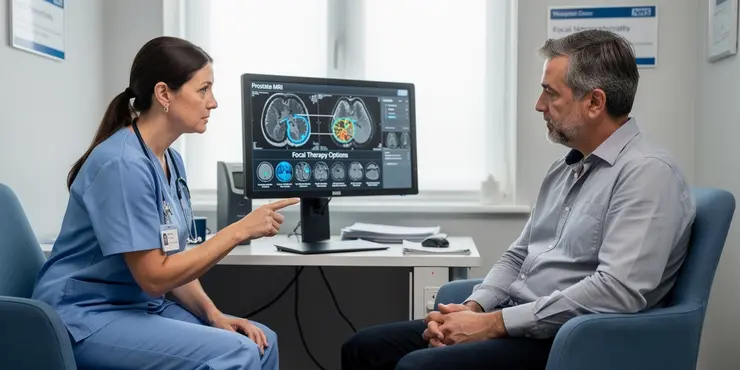
Is focal therapy an option for prostate cancer?
Relevance: 29%
-

Are there specific vegetables that are more effective against prostate cancer?
Relevance: 28%
-

What type of research supports the role of diet in prostate cancer management?
Relevance: 28%
-

Can I access prostate cancer information online through the NHS?
Relevance: 27%
-
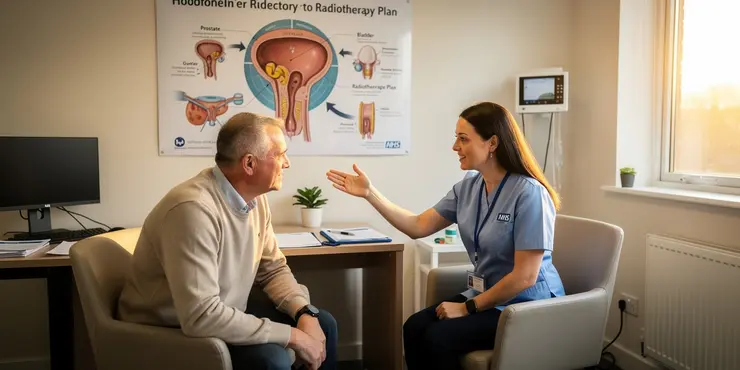
What is it like having Prostate Radiotherapy treatment?
Relevance: 27%
-
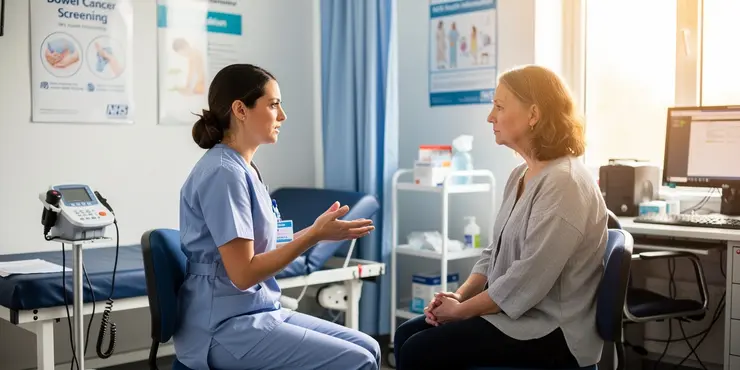
What kinds of cancer screening are available?
Relevance: 27%
-

What is benign prostatic hyperplasia (BPH)?
Relevance: 27%
-
What is the role of immunotherapy in prostate cancer treatment?
Relevance: 27%
-
Do new variants affect COVID-19 testing?
Relevance: 26%
-

What factors determine the treatment plan for prostate cancer?
Relevance: 26%
-
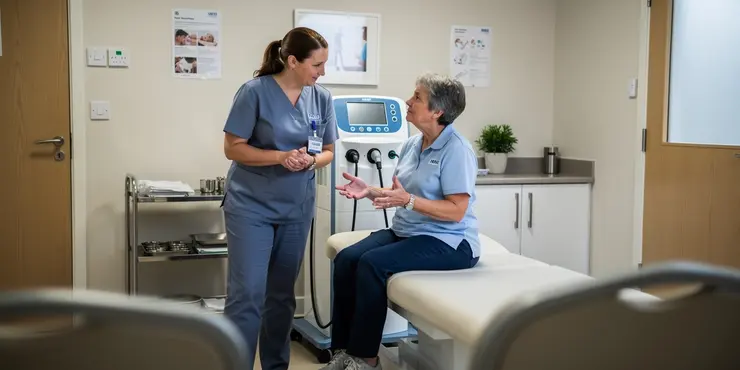
How does cryotherapy work in treating prostate cancer?
Relevance: 25%
-
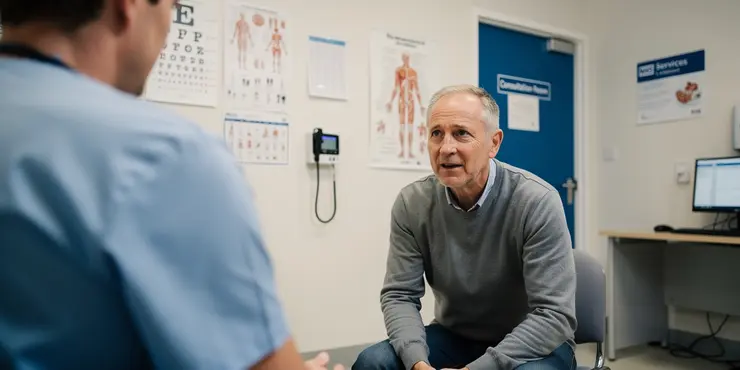
Can prostate cancer be treated with targeted therapy?
Relevance: 25%
-

Hormone Therapy for prostate cancer
Relevance: 24%
-

Is there an NHS app for managing prostate cancer care?
Relevance: 24%
-

Does the NHS offer an online hospital for prostate cancer?
Relevance: 24%
-

How is advanced prostate cancer treated?
Relevance: 24%
-

What are prostate supplements and do they work?
Relevance: 23%
-
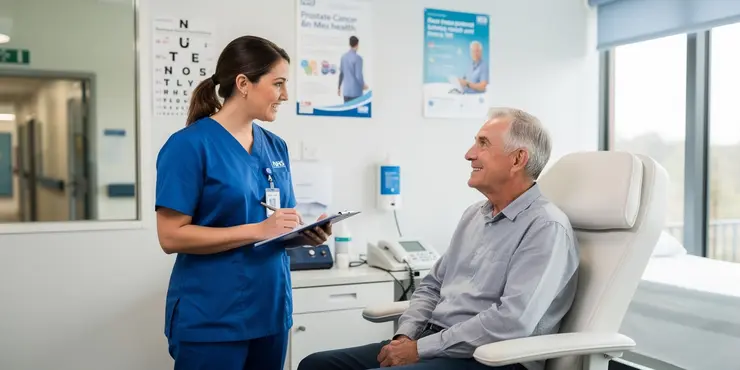
Breakthrough in Cancer Treatment Offers Hope for Prostate Cancer Patients
Relevance: 23%
-

How does surgery treat prostate cancer?
Relevance: 23%
Understanding the Prostate Specific Antigen (PSA) Test
The Prostate Specific Antigen (PSA) test is a crucial tool in the early detection and monitoring of prostate health issues in men. Conducted through a simple blood test, it measures levels of PSA, a protein produced by both normal and malignant cells of the prostate gland, in the bloodstream. Aimed primarily at men over the age of 50, the PSA test can provide early indicators of prostate cancer or other prostate-related conditions. While it is a widely used diagnostic tool, it’s important to understand its nuances and implications.
How the PSA Test Works
The PSA test involves drawing a small amount of blood from the patient, which is then analyzed in a laboratory to measure the level of PSA. Elevated levels of PSA in the blood can signal the presence of prostate cancer, benign prostatic hyperplasia (BPH), or inflammation of the prostate, known as prostatitis. However, elevated levels do not definitively diagnose cancer, necessitating further examination such as a biopsy for conclusive results.
Interpreting PSA Test Results
PSA levels are often measured in nanograms per milliliter (ng/mL). Typically, a PSA level under 4 ng/mL is considered normal, but this can vary based on age and other risk factors. Higher levels might suggest the need for additional tests. It's crucial for patients to discuss their individual results with healthcare providers, considering personal health history and current symptoms, to understand the implications fully and decide on the next steps.
Benefits and Limitations of the PSA Test
The primary benefit of the PSA test is its ability to detect potential prostate issues early, allowing for timely intervention. Early detection significantly improves treatment outcomes for prostate cancer. However, the test also has limitations. Elevated PSA levels can lead to false positives, causing unnecessary stress and potentially invasive follow-up tests. Conversely, prostate cancer does not always produce high PSA levels, resulting in false negatives. Thus, the PSA test is usually accompanied by other diagnostic procedures to verify results.
Access to PSA Testing in the UK
In the United Kingdom, men over 50 can request a PSA test through the National Health Service (NHS). Importantly, men with a family history of prostate issues, those of African-Caribbean or African descent, and individuals with other specific risk factors may consider starting PSA testing earlier. Consulting with a healthcare professional is essential for understanding personal risk factors and making informed decisions about prostate health screening.
Understanding the Prostate Specific Antigen (PSA) Test
The PSA test is a simple blood test. It helps find out if there are problems with the prostate in men. The prostate is a small gland that makes a protein called PSA. Both healthy and unhealthy prostate cells make PSA. The PSA test is important for men over 50 years old. It can help find prostate cancer or other prostate problems early. But it's important to know what the test can and cannot show.
How the PSA Test Works
For the PSA test, a doctor or nurse takes a small amount of blood from you. They send the blood to a lab to check the PSA level. High PSA levels can mean prostate cancer or other issues like an enlarged prostate or prostate inflammation. If you have high PSA, you might need more tests like a biopsy to know for sure.
Interpreting PSA Test Results
PSA levels are measured in tiny amounts called nanograms per milliliter (ng/mL). A level under 4 ng/mL is usually normal, but this can change with age and health. Higher PSA levels mean you might need more tests. It's important to talk with your doctor about your test results and decide what to do next based on your health history and symptoms.
Benefits and Limitations of the PSA Test
The PSA test is good because it can find prostate problems early. Early detection makes treatment more successful. But the test is not perfect. High PSA levels can sometimes mean there's no real problem, leading to unnecessary worry and tests. Also, not all prostate cancer causes high PSA, so the test can miss some cancers. This is why doctors often use other tests along with the PSA test.
Access to PSA Testing in the UK
In the UK, men over 50 can ask for a PSA test from the National Health Service (NHS). Men with a family history of prostate problems, men of African-Caribbean or African descent, and men with certain risk factors might need to start testing earlier. It's important to talk to a healthcare professional about your risks and decide if a PSA test is right for you.
Frequently Asked Questions
What is a PSA test?
A PSA test is a blood test used to measure the level of prostate-specific antigen (PSA) in the blood, which is produced by the prostate gland. It's often used to help detect prostate cancer in men.
Who should consider getting a PSA test?
Men over the age of 50, and those over 45 with a family history of prostate cancer or men of African-Caribbean or African descent, might consider having a PSA test. It's important to discuss the advantages and disadvantages with your GP.
How is a PSA test performed?
A PSA test is performed through a simple blood sample, typically taken from the arm.
What are normal PSA levels?
Normal PSA levels can vary based on age and other factors, but generally, a PSA level of less than 3 ng/mL is considered normal for most men.
What can cause elevated PSA levels?
Elevated PSA levels can be caused by prostate cancer, but also by conditions such as benign prostatic hyperplasia (BPH), prostatitis, or even recent ejaculation or vigorous exercise.
Is a PSA test a definitive test for prostate cancer?
No, a PSA test is not definitive for prostate cancer. Elevated PSA levels may lead to further testing, such as a digital rectal exam (DRE) or a prostate biopsy, to confirm a diagnosis.
What are the risks of a PSA test?
Risks of a PSA test include false positive or false negative results, which can lead to unnecessary anxiety, further testing, and potential side effects from treatments.
How often should I have a PSA test?
The frequency of PSA testing depends on individual risk factors and should be discussed with your healthcare provider to tailor a plan that fits your age, health, and family history.
What should I do if my PSA levels are elevated?
If you have elevated PSA levels, your doctor might recommend additional tests to determine the cause, such as a repeat PSA test, an MRI, or a biopsy.
Can a PSA test detect other conditions besides prostate cancer?
Yes, a PSA test can indicate other prostate issues like benign prostatic hyperplasia (BPH) or prostatitis, as well as urinary infections.
What factors can influence PSA levels?
Several factors can influence PSA levels, including age, race, prostate size, medications, and recent ejaculation or prostate manipulation.
What preparation is needed before a PSA test?
Generally, no special preparation is required for a PSA test, but you may be advised to avoid ejaculation and heavy exercise for 48 hours before the test.
Are there alternatives to the PSA test for prostate cancer screening?
Other tests like a digital rectal exam (DRE) or imaging studies such as MRI may be used in conjunction with PSA testing. These alternatives should be discussed with a healthcare provider.
Can lifestyle changes affect PSA levels?
Healthy lifestyle changes such as a balanced diet, regular exercise, and maintaining a healthy weight may contribute to overall prostate health, though the impact on PSA levels can vary.
Where can I get a PSA test in the UK?
PSA tests are available through the NHS, and you can consult your GP for advice on getting the test and discussing your options.
What is a PSA test?
A PSA test is a simple blood test. It checks for signs of prostate issues. The prostate is a small gland in men. Doctors use the test to help see if the prostate is healthy.
Here's how it works:
- You visit the doctor.
- The doctor takes a small amount of blood from your arm.
- The blood is tested for PSA, which is a protein made by the prostate.
Why is this test important?
- It can help find problems early.
- It can help doctors decide if more tests are needed.
If you need help understanding your test, ask the doctor to explain clearly.
Using simple words and pictures can help you understand better. You can also bring a friend or family member to help you ask questions.
A PSA test is a blood test. It checks for a thing called prostate-specific antigen (PSA) in your blood. The prostate gland makes PSA. This test helps doctors find out if someone might have prostate cancer.
To make reading easier, use your finger to follow the words. You can also read out loud or ask someone to read with you.
Who should think about having a PSA test?
A PSA test is a blood test for men to check for prostate problems. Here is who might need one:
- Men over 50 years old
- Men with family members who had prostate problems
- Men with health worries about their prostate
If you are worried, talk to a doctor. They can help you decide.
Using a friend or family member to talk about it can also help. They can go with you to the doctor.
Men who are older than 50 years, and men who are older than 45 years but have a family member who had prostate cancer or are from African-Caribbean or African backgrounds, can think about having a PSA test. It is a good idea to talk with your doctor about why the test might be good or bad for you.
How do you get a PSA test?
A PSA test is a simple blood test. Here is how it works:
- You go to the doctor’s office.
- The doctor or nurse takes a small sample of your blood.
- This blood is sent to a lab to check your PSA levels.
- Your doctor will tell you the results and what they mean.
If you need help understanding this, you can:
- Ask a friend or family member to explain it to you.
- Draw a picture of the steps to help you understand.
- Use a video or an audio guide about PSA tests.
A PSA test is done with a simple blood test. A small amount of blood is taken from your arm.
What are normal PSA levels?
Normal PSA levels are numbers that tell us how healthy the prostate is.
PSA stands for Prostate-Specific Antigen. It is something that is found in men’s blood.
Doctors use a blood test to check the PSA level. A normal PSA level means the prostate is healthy.
Everybody is different, but it is good to ask the doctor what PSA level is normal for you.
Here are some tips to help understand PSA levels:
- Ask questions if you do not understand.
- Write down what the doctor says.
- Take someone with you to the doctor for support.
PSA levels tell us about men's health. A normal PSA level is usually less than 3. This is normal for most men.
What can make PSA levels go up?
High PSA levels can happen if you have prostate cancer. But other things can cause high PSA too. It can happen if you have a condition called benign prostatic hyperplasia (we can call this BPH for short). BPH makes the prostate bigger. High PSA can also happen if you have an inflamed prostate, which is called prostatitis. Even activities like recent sex or hard exercise can make PSA levels high.
Does a PSA test show for sure if you have prostate cancer?
No, a PSA test does not tell you for sure if you have prostate cancer. If the PSA number is high, doctors might do more tests. These tests could be a digital rectal exam (DRE) or a prostate biopsy to find out if you have cancer for sure.
What could go wrong with a PSA test?
Getting a PSA test can sometimes show the wrong results. This means it might say you have a problem when you don’t, or it might miss a problem you do have. These mistakes can make you worried. They might also make you need more tests or treatments that can make you feel not well.
How often should I get a PSA test?
A PSA test checks for prostate problems. Ask your doctor how often to get the test. It depends on your age and health.
Here are some tips to help you:
- Take a friend or family member to your doctor visit.
- Write down questions before your visit.
- Ask your doctor to explain test results in a simple way.
How often you get a PSA test depends on different things. You should talk to your doctor to make a plan that is right for you. This plan will think about how old you are, how healthy you are, and if anyone in your family has had health problems like yours before.
What should I do if my PSA levels are high?
If your PSA levels are high, here are some steps you can take:
- Talk to your doctor: Ask your doctor what high PSA levels mean for you.
- Learn more: Find out what PSA means. It stands for "Prostate-Specific Antigen." PSA levels are checked to see if there might be problems with your prostate.
- Ask questions: Don’t be afraid to ask your doctor questions. It's important to understand your health.
- Write things down: Take notes when talking to your doctor so you don’t forget anything important.
- Bring someone with you: You can ask a friend or family member to go with you to appointments for support.
Remember, it's okay to ask for help and to learn about your health.
If your PSA levels are high, the doctor might do more tests. This could be another PSA test, an MRI scan, or a biopsy. These tests help find out why your PSA is high.
Can a PSA test find other problems besides prostate cancer?
A PSA test looks at blood to help find prostate cancer. But it can also show other issues. The PSA levels can go up for reasons that are not cancer.
Here are some other things a PSA test can find:
- Enlarged prostate, which just means the prostate is bigger.
- Prostate infection, also called prostatitis.
- Other non-cancer problems.
Using simple words or pictures can help understand more about PSA tests. Consider asking a doctor or a nurse for help to understand your test results.
Yes, a PSA test can show other problems with the prostate. These problems can be a bigger prostate (called BPH), swelling of the prostate (called prostatitis), or infections in the urine.
If you need help reading, you can:
- Use a text-to-speech tool to listen to the words.
- Read together with a friend or helper.
- Break the text into small parts and take breaks.
What things can change PSA levels?
Many things can change PSA levels in the body. These things include how old you are, your race, the size of your prostate, the medicines you take, and if there has been recent ejaculation or touching of the prostate.
Here are some tips to help understand:
- Ask a doctor or nurse about PSA levels.
- Use pictures or videos to learn more.
- Read with a friend or family to help explain big words.
How do I get ready for a PSA test?
Here is how you can get ready for your PSA test:
- Talk to someone you trust. Ask a doctor or nurse for help.
- Don’t do hard exercise the day before the test.
- Try to avoid riding a bike before the test.
- Talk about any medicine you take with your doctor.
It can help to bring someone with you to the test.
You usually do not need to do anything special to get ready for a PSA test. But your doctor might tell you not to ejaculate or do hard exercise for two days before the test.
Are there other tests for prostate cancer besides the PSA test?
Yes, there are other tests to check for prostate cancer. Here are some ways:
- A doctor might check your prostate using their finger. This is called a "digital rectal exam" or DRE.
- Sometimes, doctors use an ultrasound machine to look at the prostate.
- There are other blood tests that might help find prostate problems.
Talking with your doctor can help you choose what’s best.
Tools that can help you understand more:
- Ask your doctor to explain in simple words.
- Look for pictures or videos online that show how these tests work.
- You can bring someone with you to the doctor to help you remember things.
Other tests, like a digital rectal exam (DRE) or imaging tests like MRI, can be done with the PSA test. Talk to your doctor about these options.
Can changing how you live change PSA levels?
Keeping your body healthy can help your prostate. You can do this by eating good food, exercising, and staying at a healthy weight. These habits might help your prostate, but they may not always change your PSA levels.
Where can I get a PSA test in the UK?
You can get a PSA test at the doctor's office.
The doctor might be from the NHS or a private doctor.
You will need to talk to the doctor first.
The doctor will explain the test to you.
They will give you advice and let you know what happens next.
If you find reading hard, you can ask someone you trust to help you understand this.
You can get a PSA test from the NHS. Talk to your doctor to find out how to get the test and to discuss what to do next.
Useful Links
This website offers general information and is not a substitute for professional advice.
Always seek guidance from qualified professionals.
If you have any medical concerns or need urgent help, contact a healthcare professional or emergency services immediately.
Some of this content was generated with AI assistance. We’ve done our best to keep it accurate, helpful, and human-friendly.
- Ergsy carfully checks the information in the videos we provide here.
- Videos shown by Youtube after a video has completed, have NOT been reviewed by ERGSY.
- To view, click the arrow in centre of video.
- Most of the videos you find here will have subtitles and/or closed captions available.
- You may need to turn these on, and choose your preferred language.
- Go to the video you'd like to watch.
- If closed captions (CC) are available, settings will be visible on the bottom right of the video player.
- To turn on Captions, click settings .
- To turn off Captions, click settings again.
More Items From Ergsy search
-

Prostate Specific Antigen (PSA) test
Relevance: 100%
-

Ask for a prostate specific antigen (PSA) test along with your annual cholesterol check.
Relevance: 82%
-

What is PSA testing?
Relevance: 67%
-

What are PSA levels? - Prostate Cancer
Relevance: 64%
-

Prostate cancer diagnosis and tests
Relevance: 57%
-

What is the importance of PSA levels in treatment?
Relevance: 53%
-

Does BPH increase the risk of prostate cancer?
Relevance: 43%
-

What is Prostate Cancer?
Relevance: 43%
-

Is BPH the same as prostate cancer?
Relevance: 41%
-

Treating prostate cancer
Relevance: 41%
-

What is active surveillance in prostate cancer treatment?
Relevance: 39%
-

Prostate cancer symptoms - detecting them early
Relevance: 39%
-

Living with prostate cancer
Relevance: 39%
-

Can prostate cancer recur after treatment?
Relevance: 39%
-

What is the prostate gland's role in the body?
Relevance: 37%
-

what is benign prostate hyperplasia (non-cancerous)?
Relevance: 33%
-

How is prostate cancer treated?
Relevance: 33%
-

What is the purpose of a bone scan in prostate cancer treatment?
Relevance: 32%
-

Why do men get prostate cancer?
Relevance: 32%
-

Am I more at risk of prostate cancer?
Relevance: 30%
-

Prostate Surgery
Relevance: 30%
-

Is focal therapy an option for prostate cancer?
Relevance: 29%
-

Are there specific vegetables that are more effective against prostate cancer?
Relevance: 28%
-

What type of research supports the role of diet in prostate cancer management?
Relevance: 28%
-

Can I access prostate cancer information online through the NHS?
Relevance: 27%
-

What is it like having Prostate Radiotherapy treatment?
Relevance: 27%
-

What kinds of cancer screening are available?
Relevance: 27%
-

What is benign prostatic hyperplasia (BPH)?
Relevance: 27%
-
What is the role of immunotherapy in prostate cancer treatment?
Relevance: 27%
-
Do new variants affect COVID-19 testing?
Relevance: 26%
-

What factors determine the treatment plan for prostate cancer?
Relevance: 26%
-

How does cryotherapy work in treating prostate cancer?
Relevance: 25%
-

Can prostate cancer be treated with targeted therapy?
Relevance: 25%
-

Hormone Therapy for prostate cancer
Relevance: 24%
-

Is there an NHS app for managing prostate cancer care?
Relevance: 24%
-

Does the NHS offer an online hospital for prostate cancer?
Relevance: 24%
-

How is advanced prostate cancer treated?
Relevance: 24%
-

What are prostate supplements and do they work?
Relevance: 23%
-

Breakthrough in Cancer Treatment Offers Hope for Prostate Cancer Patients
Relevance: 23%
-

How does surgery treat prostate cancer?
Relevance: 23%


